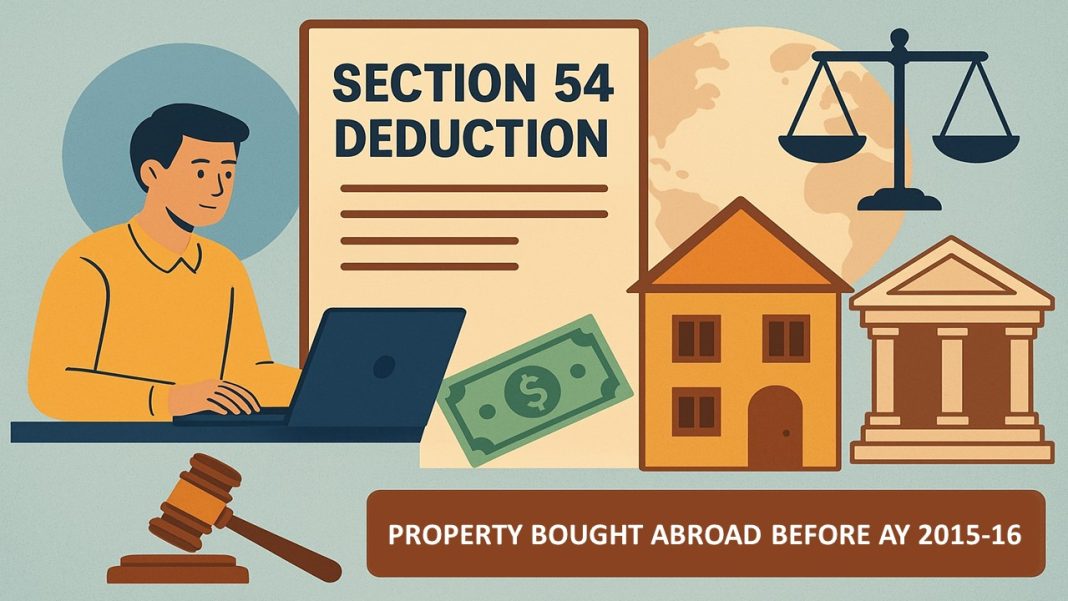Section 54 Deduction Can Be Claimed for Property Purchased Abroad Before AY 2015-16: ITAT
The Income Tax Appellate Tribunal (ITAT), Delhi, in a recent order ruled in favour of an assesse, allowing him to claim a deduction on a property bought abroad before AY 2015-16 and rejected unexplained cash deposit additions.
The assessee, Jagdish Chand Verma, a 70-year-old retired banker, sold his Flat in Delhi in October 2013, for Rs 70,00,000, earning a capital gain of Rs 54,35,000. After his retirement, he permanently moved to Australia with his sons and purchased a residential property there for $5,50,000. During the period, some cash of his spouse and son was deposited into his bank account, amounting to Rs. 40,51,000.
The assessing officer, during the assessment proceedings, disallowed Rs 54,35,000 as the AO had no information about the purchase of a new property, and he also treated Rs 40,51,000 as unexplained cash credit under section 68 of the Income Tax Act. These additions were challenged by the assessee before the CIT(A), where the assessee duly filed the additional proofs, like documents for the purchase of property in Australia, home loan documents, bank statements, a copy of the passport, and affidavits for the deposit.
The CIT(A), in its order, held that the amendment to Section 54 requires the new property to be purchased in India, so it disallowed the deduction under Section 54. Further, the CIT(A) upheld the addition of Rs 40,51,000 as unexplained cash, saying that just the affidavits for the deposits of cash from family members were not sufficient evidence. Therefore, the CIT(A) rejected the appeal filed by the assessee.
Aggrieved by the CIT(A)’s order, the assessee approached the Income Tax Appellate Tribunal (ITAT), Delhi.
The Tribunal observed that the amendment to Section 54, which requires the new property to be in India, was applicable from AY 2015-16 onwards, as mentioned in the CBDT Circular No. 01/2015 dated 21 January 2015. As the property outside India was bought before this period, the assessee is eligible to claim the deduction under section 54 of the Income Tax Act. The Tribunal also cited the decision of Hon’ble High Court of Karnataka in Commissioner of Income Tax vs. Vinay Mishra reported in 2020] 121 taxmann.com 243 (Karnataka), and Income-tax v. Shri. Hosagrahar I.T.A. NO.601 OF 2019 order 05-03- 2021, which also supported that the amendments were applicable from 01.04.2015 and will apply to the Assessment year 2015-16. Therefore, the Tribunal held that the CIT(A) was wrong in treating the amendment as clarificatory.
Regarding the other addition under section 68 addition, the ITAT observed that the assessee did not have any business and there were no credits in the books of accounts, which is the precondition to make an addition under 68 of the Act. The Supreme Court, in the case of Baladin Ram Vs. CIT [1969] 7 ITR 427, has clarified that the passbook of a bank cannot be treated as the books of accounts. Similarly, the Delhi High Court in the case of CIT vs. Ms. Mayawati, reported in 338 ITR 563 [DEL], also held that cheques deposited in bank accounts cannot be treated as books of accounts and section 68 cannot be invoked in such a situation.
Based on these findings, the Tribunal allowed the appeals of the assessee and deleted both the additions.
Case Citation: Jagdish Chand Verma Vs Income Tax Officer (ITAT Delhi); ITA No.2417/Del/2025; 12/11/2025; 2014-15



